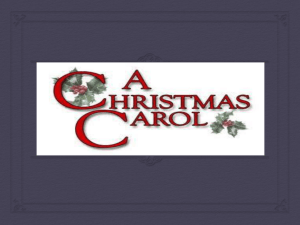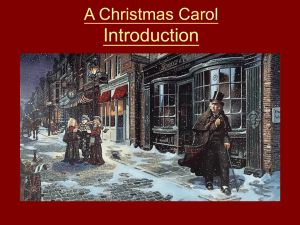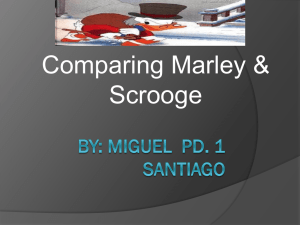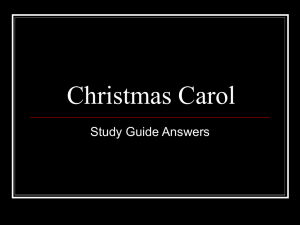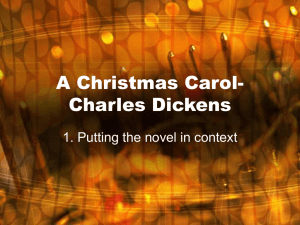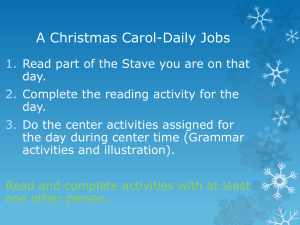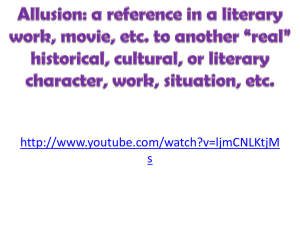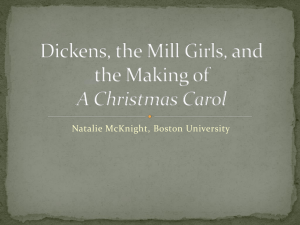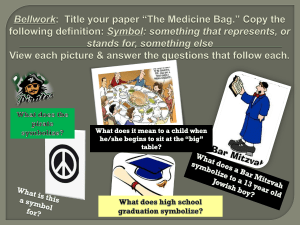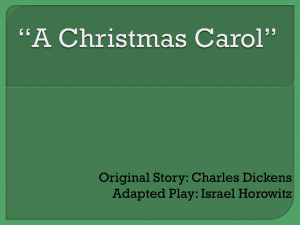A Christmas Carol
advertisement
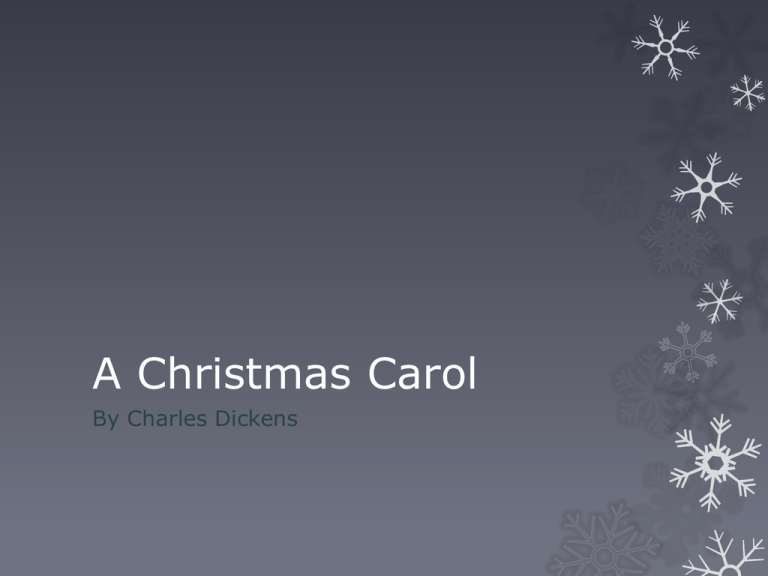
A Christmas Carol By Charles Dickens CHARLES DICKENS ABOUT THE AUTHOR Charles Dickens Charles Dickens Childhood Charles John Huffman Dickens Born February 7, 1812, in England – died June 9, 1870 Second of Seven children Sickly child, read books instead of playing with other children Our background affects us Dickens’s fictional work is intertwined with the real events of his past February 1824 Father, John Dickens, was put in debtor’s prison Charles, now twelve, began working at a factory gluing labels on bottles of shoe blacking Charles Dickens the Author Writing career started at age 15 Own experiences created a concern for poor and disadvantaged Especially children – play a prominent role in many of his works obstacles they face in bringing their desires/dreams to fruition Writing helped his countrymen become aware of the effects of an industrialized society on all people Common Motifs: Failure and Redemption Overcrowded prisons Poorly organized schools Impoverished street urchins and beggars A CHRISTMAS CAROL THE NOVEL A Christmas Carol Published 1843 Dickens completed the novel in a few weeks – began as a need for money Message = keeping the Christmas spirit throughout the year After publication, the Christmas season changed dramatically in England First Christmas card was sold Tree decoration Celebrating with family feasts Uses humor Ghost stories were prevalent in England at Christmas season Centered in London A Christmas Carol Proper roles of money and work in life The heartlessness of industrial society broods over the story as a whole, and is effectively personified in the person of Scrooge Bob Cratchit Counterpart to the Scroogian values of selfishness and money hoarding Money, class, and rank are unreliable guidelines for determining human worth in Dickens’ fictional world True merit is often hidden among the rags and ignorance of the poor and abandoned Tiny Tim Reminder of youthful potential spoiled by poverty Literally trapped in metal parts in a way that summons pictures of children working endlessly at factory machines A Christmas Carol While most readers today remember Scrooge, first readers identified most with the Cratchit family. Even in poverty, the winter holiday can inspire good will and generosity toward one’s neighbors Spirit of Christmas can live on in an industrialized world Dickens was disillusioned by the greed that seemed to govern the new commercial interests (Industrial Revolution) Telling ghost stories was an English and American custom in the 1800s. In each, a protagonist with false values is subjected to extraordinary events, which lead him to see his errors and be transformed A Christmas Carol – Dickens’s England Railroads made commuting into the city (financial heart of England) possible. Even poor clerks (Cratchit) began commuting East End = poverty, misery, slums Atmosphere/environment Fog in London was very real – a great yellowness was everywhere. Lamps were lit during the day Blamed in part on coal stoves The sky would turn black from all of the coal Caused deaths A Christmas Carol – Dickens’s England Horse manure on the ground Etiquette book advised gentlemen walk on outside of pavement to ensure the man walked on the dirtiest part of the pavement Every major street had a crossing sweeper – pay a penny to have street swept before one crossed River Thames = tons of sewage dumped daily Cholera epidemics Noises Horses hooves clacking Women’s patent leathers Call of muffin man Cries of street peddlers selling items such as dolls, matches, books, knives, pens, rat poison, key rings, eggs, and china Many children A Christmas Carol – Dickens’s England Poor House Prisoners forced to walk on treadmills all day Punishment intended to force prisoner/debtor to think about their crimes A Christmas Carol – Dickens’s England Food Poor man lived on bread 1864 Average farm worker ate one hot meal a week because fuel was expensive Cooked over open fire – not many poor people had ovens Sundays & Christmas Poor took their geese or other meals to local bake house to get them cooked No one knew about vitamins Water No one drank water because it was feared Preferred ale and beer Later in century coffee and tea A Christmas Carol – Universal Themes Scrooge (protagonist) is able to start again Represents the heartlessness of industrial society (which Dickens loathed) Dickens believes that he had done the same thing in his own life Themes: Gratitude Generosity Redemption Allegory a story in which the characters and the action represent an idea or generalization about life A Christmas Carol – Link to today Families today struggle with many of the same conflicts the Victorians faced as they confronted a new industrial world along with a new sense of family and less personal role of wage earner conflicted with that of the nurturing parent. Now both parents must usually work outside the home to provide. There are parallels between Victorian England and present-day American charity as families struggle with philanthropic versus selfish decisions on just how to use their hard-earned money. Also, this book challenges us to examine the consequences of our actions – which, in our global community, have an even greater impact than in 1840s. It’s about poor choices. Joyful memories also bring pain. And through pain, recognition. Preface – What does it mean? STAVE I MARLEY’S GHOST Stave I “ ‘Change” = Royal Exchange; a gathering place for merchants in different trades Stave “verse” Such as the verses of a Christmas carol Atmosphere/Mood Foggy, gloomy, cold, dark What does the atmosphere remind the reader of? Scrooge & Industry What phrases does Dickens use to help you “feel” the weather? “Foggier yet, and colder! Piercing, searching, biting cold.” The young caroler’s nose is “gnawed and mumbled by the hungry cold.” Who was Marley? Scrooge’s partner Why does Dickens make such a point of telling us that Marley is definitely dead? From the Stave title we can tell that Marley’s ghost will soon appear What phrases does Dickens use the let the reader know Marley was dead? “Dead” ; “register of the burial was signed by the clergy” ; “dead as a door-nail” What happened to Marley’s belongings? Scrooge took control of them. What does Marley explain about his chain? He “forged it in life” by caring, as Scrooge does, only about money and by never taking pity on those whose miserable lives he could have changed. What is he now condemned to suffer? “incessant torture of remorse” Critical Remark about the Government by Dickens He remarks that the ghosts linked together “might be guilty governments,” Meaning…. They are guilty of mistreating people just as Marley and the other ghosts did. Called an “Apostrophe” (the author addresses the reader directly) Social Inequality of the rich and the poor – Where in Stave I do we see this? Lord Mayor’s fifty cooks and butlers Laborers warming hands over the fire Coal and the clerk Money collectors and Scrooge Literary Device - Hook Compelling sentence that entices a reader into a story “MARLEY WAS DEAD: to begin with” Literary Device – Point of View Determined by the person who tells the story Author (Dickens) is the narrator Third Person Literary Device - Parallelism Repetition of a grammatical pattern, which is used to emphasize related ideas “Merry Christmas! What right have you to be merry? What reason have you to be merry? You’re poor enough” “Come, then,” returned the nephew gaily. “What right have you to be dismal? What reason have you to be morose? You’re rich enough.” Literary Device - Foreshadowing Giving clues that suggest what may happen later in the story “Mr. Marley has been dead these seven years. He died seven years ago, this very night” Literary Device - Simile Comparison using “like” or “as” “Hard and sharp as flint” “solitary as an oyster” Literary Device - Personification Giving human characteristics to nonhuman objects “the dying flame leaped up” Literary Device - Allusion A reference to a famous historical, mythological, religious, or literary person or event “designed to illustrate the Scriptures. There were Cains and Abels; Pharaoh’s daughters, Queens of Sheba, Angelic messengers descending through the air on clouds like feather-boats, hundreds of figures, to attract his thoughts; and yet that face of Marley, seven years dead, came like the ancient Prophet’s rod, and swallowed up the whole.” Literary Device – Simile-cliché Comparison using “like” or “as” AND is an overused phrase “Old Marley was as dead as a door-nail” Who said it? “Nay, Uncle, but you never came to see me before that happened. Why give it as a reason for not coming now?” FRED “We choose this time, because it is a time, of all others, when Want is keenly felt, and Abundance rejoices. What shall I put you down for?” PORTLY GENTLEMEN– asking Scrooge for charity “It’s not my business,” “It’s enough for a man to understand his own business, and not to interfere with other people’s. Mine occupies me constantly. Good afternoon, gentlemen!” SCROOGE “I wear the chain I forged in life” MARLEY Stave II THE FIRST OF THE THREE SPIRITS Time What has happened to time at the beginning of this section? The clock seems to have run backwards, as it is earlier now than it was when Scrooge went to bed The Ghost of Christmas Past Appearance How does the first spirit’s appearance seem to contradict itself? Looks both young and old What is strange about its head? A jet of light emanates from it – it holds an extinguisher under its arm The Spirit’s Advice What is significant about -- “Bear but a touch of my hand there,” said the Spirit, laying it upon his heart, “and you shall be upheld in more than this!” The Spirit hopes to touch Scrooge’s heart and the feelings he has kept hidden regarding his past How do you know? When Scrooge looks upon his boyhood scenes, his lips trembles and he sheds a tear Little boy = Scrooge How does Scrooge change completely as he watches the boy? He seems to become a little boy again, sobbing over the sight of his own lonely self, delighted to see characters from the books that were once his only comfort Note: Dickens himself escaped through literature when he was a child How does Scrooge transfer his feelings about his boyhood self back to the present? He wishes he had been kinder to the boy who came caroling the day before Fezziwig VS Scrooge How do Fezziwig and Scrooge compare as employers? Fezziwig is happy and generous, throws a Christmas party for all his employees and their friends and seems to enjoy it. He is the exact opposite of the cynical, tight-fisted Scrooge, who didn’t want to give Cratchit the day off. How does Scrooge transfer the memories of Fezziwig to thoughts of the present day? He says he wishes to have a few words with Cratchit Belle According to Belle, what is the reason she no longer wants to marry him? She claims he is so caught up in making money that she has been displaced Why does Dickens include so many children in the later scene at Belle’s home? This scene makes Scrooge realize that he has missed out on having children/grandchildren – he might have been in the other man’s shoes Note: Belle means beautiful in French The Spirit’s light - Symbolize Scrooge tries to hide the light on the spirit’s head, but cannot. Why? The light represents Scrooge’s feelings about the past, which have now come to the surface and cannot be extinguished even if he tries to forget them. He won’t be able to go back to the way things were before he met the spirit The jet of light = feelings, memory Literary Analysis – The First Spirit Scene in the past Lonely, neglected boy Scrooge’s sister, Fan Fezziwig,the generous employer Belle breaking the engagement Belle’s happy family Scrooge’s present The boy who came caroling and was driven away Scrooge’s nephew, Fred, determined to be kind Cratchit Scrooge has missed out on marriage Scrooge wishes he had children Literary Device – Dramatic Irony Reader/audience sees mistakes/misunderstandings which the character is unable to see himself “The happiness he gives is quite as great as if it cost a fortune.” Literary Device – Simile and Metaphor Comparisons (Simile uses “like” or “as”) “In came a fiddler with a musicbook, and went up to the lofty desk, and made an orchestra of it, and tuned like fifty stomach-aches. In came Mrs. Fezziwig, one vast substantial smile” Literary Device -- Flashback A flashback occurs when a past event is interjected into the chronological sequence of events in a story. Scrooge as a boy Mr. Fezziwig’s office Belle Who Said it? “The happiness he gives, is quite as great as if it cost a fortune.” Scrooge – speaking of Fezziwig “The school is not quite deserted,” said ___. “A solitary child, neglected by his friends, is left there still.” Ghost of Christmas Past “I release you. With a full heart, for the love of him you once were.” Belle Who said it? “Yo ho my boys! No more work tonight…Let’s have shutters up, before a man can say Jack Robinson!” Fezziwig “I have come to bring you home…home,home,home!” Fan “What! Would you so soon put out, with wordly hands, the light I give? Is it not enough that you are one of those whose passions made this cap, and force me through whole trains of years to wear it low upon my brow?” Ghost of Christmas Past Stave III The Second of the Three Spirits The arrival of the Second Spirit What is one thing Scrooge is not prepared for as he wakes up the second time? He is prepared for anything except nothing How does Scrooge treat the second spirit differently from the first one? He bows his head, is reluctant to look at it at all, and when he does he looks “reverently.” He asks the spirit to teach him his lesson “submissively” The arrival of the Second Spirit What is the personality of this spirit? Jolly, joyful, animated Why does it wear a rusty sheath with no sword? (Symbolisms) The swordless sheath symbolizes peace, love, forgiveness What happens to the spirit as the night wears on? Why? It gets older and older because it is a ghost of the present, of Christmas Day only, which also must end. Climate/Mood In the beginning of the Stave, how does the climate of the city street contrast with the air it has about it? In spite of the damp, gloomy, sooty look of the streets, they are filled with cheerfulness as the people go about their Christmas Day preparations Tiny Tim How does Tiny Tim affect Scrooge? He is touched and interested in whether he will survive, then very upset when the spirit foretells a vacant seat How does the Spirit humiliate Scrooge where Tiny Tim is concerned? He speaks Scrooge’s own words, “If he be like to die, he had better do it, and decrease the surplus population.” What is meant by… “…to hear the Insect on the leaf pronouncing on the too much life among his hungry brothers in the dust”? The spirit is shaming Scrooge for thinking he is better than others simply because he has more money Bob Cratchit What does Bob Cratchit’s toast to Scrooge tell you about him? He is kind and forgiving, even though Mrs. Cratchit disagrees and the children are unenthusiastic about drinking to Scrooge How do you suppose Scrooge felt as he listened to Cratchit defend him? Brief scene on the moor p.42-43 Why does Dickens include the brief scenes on the moor, at the lighthouse, and on the ship? To show that no matter how lonely and poor the circumstances, people still celebrate Christmas Fred’s house As the scene at Fred’s opens, why is everyone laughing? Fred has just told them that his Uncle thinks Christmas is a humbug Why does Fred say he has nothing to say against Scrooge? “his offences carry their own punishment…”; Fred feels Scrooge suffers more for his issues than anyone else does Fred’s house How is Scrooge’s name brought into one of the games played at the party? It is the answer in the game Yes and No – the clue describes a disagreeable animal that growled and grunted The Two Children What two children does the spirit show to Scrooge? Ignorance and Want Why does the spirit say “They are Man’s”? The spirit is presenting Dickens’ own feeling that the relief of the misery of the poor was the responsibility of everyone. What warning does the spirit use? If nothing is done about Ignorance and Want there will eventually be dire consequences Pathos Cratchit relates that while he and Tiny Tim were at church the little boy said he hoped people would look at him and remember who made the blind see and the lame walk Personification The baskets of chestnuts “loll at the doors” Onions “wink and glance” Oranges/lemons “beseech and entreat” “Master Peter Cratchit blew the fire, until the slow potatoes bubbling up, knocked loudly at the saucepanlid to be let out and peeled.” Pun “Bob has but fifteen ‘Bob’ a week himself” “Bob is slang for shilling, equal to 1/20 of a British pound Alliteration “Scrooge’s ears were deafened by the thundering of water, as it rolled, and roared, and raged among the dreadful caverns it had worn.” Stave IV The Last of the Spirits The Phantom How is the Phantom different than the others we’ve seen so far? This one is shrouded and mysterious, doesn’t say anything. Scrooge is much more afraid of him than he was of the others. What is the Spirit’s “official name”? The Ghost of Christmas Yet to Come Scrooge How do you know that Scrooge has already made the resolution to become a different kind of person? “…and as I hope to live to be another man from what I was, I am prepared to bear you company, and do it with a thankful heart.” The Three Servants Why does it turn out to be strange that the three servants arrive at the shop at the same time? They all have items to sell which they have stolen from dead Scrooge. What seems to be the attitude of all three? At first they are a bit embarrassed, but soon talk themselves into believing what they did was no sin since Scrooge was “a wicked old screw” anyway Caroline and Her Husband Why is Scrooge’s death good news for Caroline and her husband? He has been their creditor, and has been pressing them to pay their debt. Now their debt will be transferred to someone else, affording some delay, and there is little chance the new creditor could be as merciless as Scrooge Scrooge’s Death Scrooge asked the Phantom to show him some tenderness connected with the death. What did the Ghost show him? The Cratchit home, where they mourned the death of Tiny Tim What question did Scrooge ask the Ghost as they stood among the graves? He asked if the shadow were of things that Will be or May be Cratchit’s House Why are things to quiet at Cratchit’s house? Tiny Tim has just died Why do you suppose Dickens included this mild, patient, loving child in A Christmas Carol? Possibly Tiny Tim is in the story to remind the reader of the reason for Christmas, to celebrate the birth of another mild, loving, child, Jesus Theme Scrooge begs the spirit to confirm what he has learned. This is a statement of the theme of the main theme of the story. What is it? “Men’s courses will foreshadow certain ends, to which, if persevered in, they must lead…but if the courses be departed from, the ends will change.” What resolution does Scrooge make? “I will honor Christmas in my heart, and try to keep it all the year. I will live in the Past, Present, and the Future. The Spirits of all Three shall strive within me. I will not shut out the lessons that they teach” Dramatic Irony Dickens, the characters in the story, and we the readers all know whose possessions are being sold at the pawn shop. What do we know that Scrooge doesn’t? Scrooge realizes the same sort of thing could happen to him, but he doesn’t understand that the dead man IS him Who Said it? “I am sure he loses pleasanter companions than he can find in his own thoughts, either in his moldy old office, or his dusty chambers.” Fred “To whom will our debt be transferred?” Caroline “Let me see some tenderness connected with a death…” Scrooge Who Said It? “They are Man’s, and they cling to me, appealing from their fathers. This boy is Ignorance. The girt is Want. Beware of them both…” Ghost of Christmas Present “It should be Christmas Day, I am sure,…, on which one drinks the health of such odious, stingy, hard, unfeeling man as Mr.Scrooge…” Mrs.Cratchit “I see, I see. The case of this unhappy man might be my own. My life tends that way, now. Merciful Heaven, what is this!” Scrooge Who Said It? “As good as gold and better,…Somehow he gets thoughtful, sitting by himself so much, and thinks the strangest things you ever heard. He told me coming home, that he hoped the people saw him in church, because he was a cripple, and it might be pleasant to them to remember ,upon Christmas Day, who made the lame beggars walk and blind man see.” Bob Cratchit “Ha, ha! We’re all suitable to our calling, we’re well matched. Come into the parlor. Come into the parlor.” Joe Who Said It “I have known him to walk with – I have known him to walk with Tiny Tim upon his shoulder very fast indeed.” Mrs. Cratchit “If he wanted to keep’em after he was dead, a wicked old screw…why wasn’t he natural in his lifetime? If he had been, he’d have had somebody to look after him when he was struck with Death instead of lying gasping out his last three, alone by himself.” Charwoman Stave IV For what is Scrooge most grateful when he wakes up in “present time”? He has the time to make amends. What can you infer from the line, “The father of a long, long line of brilliant laughs!”? That Scrooge will be laughing a lot in the future. Figure of Speech = metaphor How does the weather on this Christmas Day contrast with the weather in the opening scene? It is clear and sunny Why is it important that Scrooge wanted his gift to the Cratchits to be anonymous? He wanted to simply GIVE, did not expect or want Cratchit to feel indebted to him because of it Why was Scrooge surprised to learn that it was Christmas morning? Marley’s Ghost had told him that the Spirits would visit him on three successive nights: he had gone to sleep on Christmas Eve and had seen all three spirits Why did Scrooge say he would love the door knocker as long as he lived? It had alerted him to the presence of the spirits that saved his life With your new understanding of Scrooge’s character, update the back side of your Scrooge head. Turn this in for a grade!
